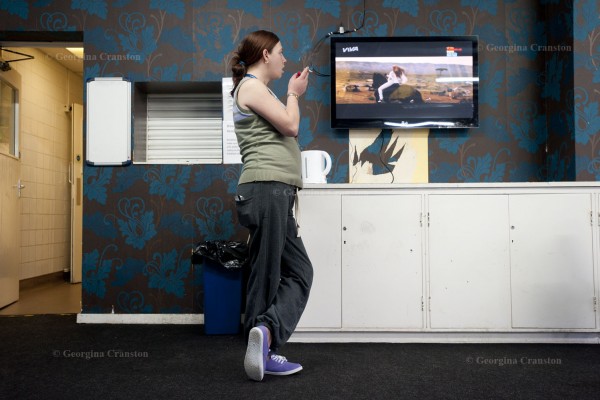Keeley, 29
This is Keeley’s story, told in her own words:
(You may find the contents of this story upsetting.)
“Social Services kept chucking me from pillar to post. I was in 29 placements in less than two months. Children’s homes, foster carers, children’s homes, foster placements. I was about 12. I just had enough. I’ve been let down a great deal by a lot of people saying they’ll be there and they haven’t.
I was on the streets for about a year at the age of 13. It is young, but sometimes that’s life. I had to grow up very quickly. I was very streetwise. It’s like another sort of family network where I was the youngest. I was always looked after but because I’m very independent I still had to go and get my own money. At that time I was also taking drugs – heroin and crack – so I had to fund that habit. Shoplifting – that’s how I survived. But I relied on them vans that come round with the food and the hot soup and blankets.

When I came here [St Mungo’s hostel] it’s just so different. Everyone cares. It’s like a big family. They are always there. When they say they are going to be there they mean it. When I came here I had such a chaotic life, and I convinced myself that I wasn’t going to stay. But it just turned me around because there is such great support.
The staff are always there, they always ask you if you are OK, how you are feeling. It’s not just a job to them – they get very involved because they care. You have your own key worker – Deb is my key worker and she’s been wonderful. As for Julie, the manageress, she’s just the best. I’ve been shown a lot of love, a lot of caring. And that counts – because a lot of people don’t have that. And when they come to this hostel they settle down. You feel so wanted.
I vowed I would never stay but I have been here four years. It has been on and off. Once, I left for my boyfriend. But that was a violent relationship so I’ll say no more. The other times were when I’ve gone to prison. I’ve been to prison eight times. It’s the drugs. You need the money for the drugs so you commit crimes. I was lucky enough to get an HDC tag [Home Detention Curfew] which I have on now. They spoke to Julie and she said they would have me back, otherwise I would be in prison until February [another five months].
When you go into prison, you are off the drugs so your emotions start coming back. To be truthful, when I first went to prison, I wasn’t ready to come off heroin. I was alright taking it and I didn’t want to come off it. I was 18, and I thought I knew everything. Looking back, I wish I had just come off and stayed off. That’s the hardest. The temptations, the people you see, your associates. There’s a lot more support in the prisons now. There’s AA meetings and NA meetings where people come in and share their story. They’ve been there, seen it, done it. They’ve been through it, they’ve had a bad time, but they’ve recovered and they are in recovery.
You have to sort something out [for accommodation] while you’re in prison, and the majority of the time that doesn’t happen. So you just go back to your old lifestyle. Drugs, drink, back on the streets, shoplifting, thieving, begging, doing whatever you can to get by. Because that’s the only life you know.
I found yoga good. I’ve done yoga in prison. It’s a mindset thing. If you just set your mind into your own space then you can block everything out. It’s very relaxing. Very. I used to be a gymnast when I was younger. I started when I was about five or six. I went to Liverpool Interstrada and the next year I was going to Russia for Cambridge House. But unfortunately things happened in my family. I did everything – bar, beam, vault, floor. Put it this way, I probably would have ended up in the Olympics. I can still do the splits.”
(All material on this page is copyright of Georgina Cranston. Text editing by Sarah Carrington.)
